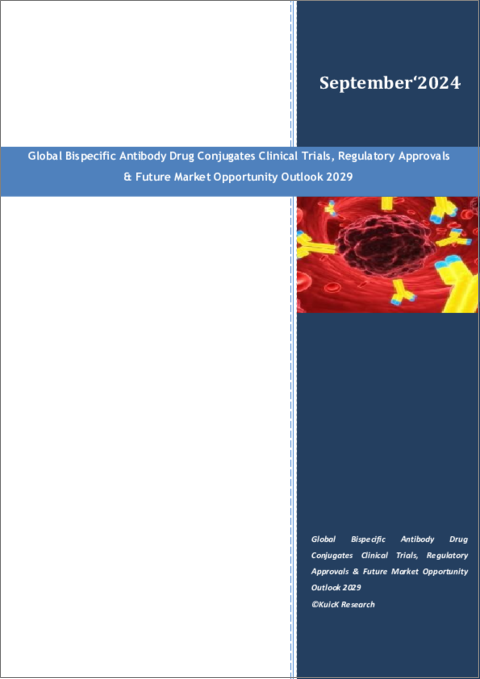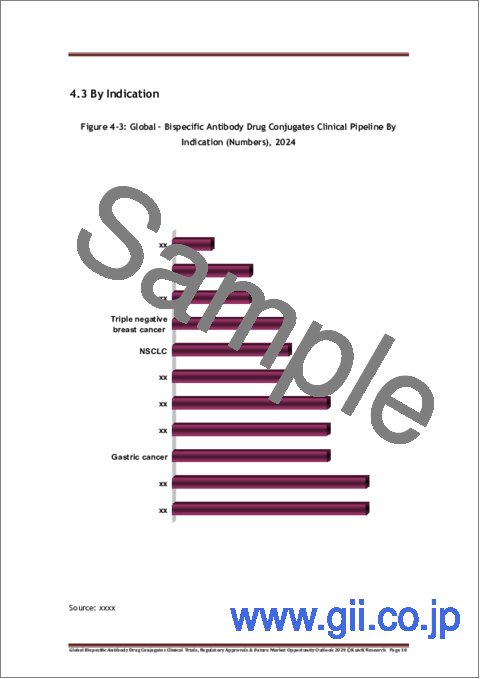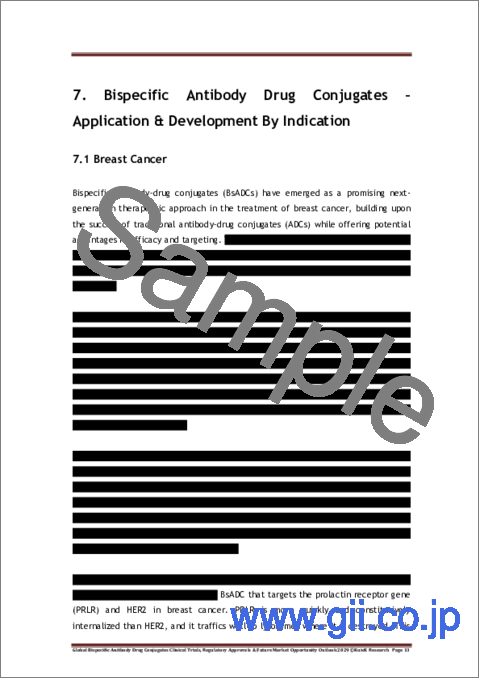|
|
市場調査レポート
商品コード
1555006
二重特異性抗体薬物複合体の世界市場:臨床試験、薬事承認、今後の市場機会見通し(2029年)Global Bispecific Antibody Drug Conjugates Clinical Trials, Regulatory Approvals & Future Market Opportunity Outlook 2029 |
||||||
|
|||||||
| 二重特異性抗体薬物複合体の世界市場:臨床試験、薬事承認、今後の市場機会見通し(2029年) |
|
出版日: 2024年09月01日
発行: KuicK Research
ページ情報: 英文 180 Pages
納期: 即日から翌営業日
|
全表示
- 概要
- 図表
- 目次
二重特異性抗体薬物複合体(BsADC)は、化学療法薬の強力な細胞毒性と二重特異性抗体の特異性を併せ持つ、新規でエキサイティングな標的がん治療薬のクラスです。免疫エフェクター細胞との同時作用、がん細胞上の2つの異なる抗原の標的化、あるいは同一抗原上の重複しない2つの領域の標的化を通じて、これらの革新的な方法は、従来の抗体薬物複合体(ADC)の治療域と有効性を改善しようとするものです。世界のBsADC産業はまだ初期段階にあるが、今後数年間で、さらに多くの候補が臨床試験を経て市販されるようになり、大きく成長すると予想されます。
二特異性抗体薬物複合体を従来の単特異性抗体薬物複合体と比較すると、多くの潜在的な利点があります。二特異性抗体薬物複合体は、2つの異なるエピトープに結合することで、より選択的に腫瘍を標的とすることができます。二特異的結合は、がん細胞における薬物の取り込みと放出を促進する可能性があります。標的薬物投与と免疫活性化は、腫瘍抗原と結合し、T細胞やNK細胞などの免疫細胞を腫瘍微小環境に引き寄せる特定の二重特異性抗体薬物結合体の能力と組み合わせることができます。
開発中の二重特異性抗体薬物複合体の安全性と予備的有効性は、初期の臨床データで有望な結果を示しています。例えば、固形がんのがん細胞株や動物モデルにおいて、BVX002(未公開の抗原ペアを標的とする)やVBC103(TROP2とNectin-4を標的とする)などの候補は、有望な抗腫瘍活性と管理可能な毒性プロファイルを示しています。二重特異性抗体薬物複合体の治療上の利点と潜在的な欠点を、他の利用可能な治療法と比較して完全に理解するためには、他の革新的な治療法と同様に、さらなる調査が必要です。
製薬会社は、商業的な見地から世界の二重特異性抗体薬物複合体の臨床開発に大きな関心を示し、投資を行っています。Amgen、Innovent Biologics、AstraZenecaといった抗体薬物複合体市場の主要企業は、二特異性抗体薬物複合体候補を積極的にパイプラインに追加しています。一方、専門的なバイオテクノロジー企業は、独自のプラットフォームを使って最先端の二特異性抗体薬剤結合治療を開発しています。
当レポートは、世界の二重特異性抗体薬物複合体市場について調査し、市場の概要とともに、薬剤動向、臨床試験動向、地域別動向、および市場に参入する企業の競合情勢などを提供しています。
目次
第1章 二重特異性抗体薬物複合体の構想と開発の継続
- 概要
- 二重特異性抗体薬物複合体とその他の免疫療法との比較
第2章 二重特異性抗体薬物複合体の必要性
第3章 二重特異性抗体薬物複合体- 設計と作用機序
- 二重特異性抗体薬物複合体の一般構造と設計
- 作用機序
第4章 世界の二重特異性抗体薬物複合体の臨床試験の概要
- 企業別
- 国別
- 適応症別
- 相別
- ターゲット別
第5章 世界の二重特異性抗体薬物複合体市場の洞察
- 現在の市場シナリオ
- 将来の市場機会
第6章 二重特異性抗体薬物複合体市場分析、地域別
- 中国
- 米国
- 欧州
- 韓国
第7章 二重特異性抗体薬物複合体- 適応症別の応用と開発
- 乳がん
- 消化器がん
- 肺がん
- 泌尿器がん
- 婦人科がん
第8章 二重特異性抗体薬物複合体の臨床試験に関する企業、国、適応症、相別の考察
- 研究
- 前臨床
- 第I相
- 第II相
- 第III相
第9章 二重特異性抗体薬物複合体の開発に使用されるプラットフォーム技術
第10章 競合情勢
- Alphamab Oncology
- Amgen
- AstraZeneca
- Beijing Biocytogen
- BiVictriX Therapeutics
- Corellia AI
- Debiopharm
- Doma Bio
- Genmab
- Innovent Biologics
- ProEn Therapeutics
List of Figures
- Figure 1-1: Limitations Of Convectional Immunotherapies Addressable By BsADCs
- Figure 3-1: Bispecific Antibody Drug Conjugate - General Structure
- Figure 3-2: Bispecific Antibody Drug Conjugate - General Mechanism of Action
- Figure 4-1: Global - Bispecific Antibody Drug Conjugates Clinical Pipeline By Company (Numbers), 2024
- Figure 4-2: Global - Bispecific Antibody Drug Conjugates Clinical Pipeline By Country (Numbers), 2024
- Figure 4-3: Global - Bispecific Antibody Drug Conjugates Clinical Pipeline By Indication (Numbers), 2024
- Figure 4-4: Global - Bispecific Antibody Drug Conjugates Clinical Pipeline By Phase (Numbers), 2024
- Figure 4-5: Global - Bispecific Antibody Drug Conjugates Clinical Pipeline By Target (Numbers), 2024
- Figure 5-1: Bispecific Antibody Drug Conjugate Market Forecast - First 12 Months & First 24 Months Of Approval Of First Drug (US$ Million)
- Figure 7-1: BL-B01D1-306 Phase III (NCT06343948) Study - Initiation & Estimated Completion Year
- Figure 7-2: BL-B01D1-307 Phase III (NCT06382142) Study - Initiation & Estimated Completion Year
- Figure 7-3: BL-B01D1-204-04 Phase II (NCT06471205) Study - Initiation & Estimated Completion Year
- Figure 7-4: BL-B01D1-SI-B003-201-04 Phase II (NCT06042894) Study - Initiation & Estimated Completion Year
- Figure 7-5: BL-B01D1-LUNG-101 Phase I (NCT05983432) Study - Initiation & Estimated Completion Year
- Figure 7-6: BL-B01D1-104 Phase I (NCT05470348) Study - Initiation & Estimated Completion Year
- Figure 7-7: KM501-1001 Phase I (NCT05804864) Study - Initiation & Estimated Completion Year
- Figure 7-8: ZWI-ZW49-101 Phase I (NCT03821233) Study - Initiation & Estimated Completion Year
- Figure 7-9: BL-B01D1-SI-B003-201-05 Phase II (NCT06008054) Study - Initiation & Estimated Completion Year
- Figure 7-10: BL-B01D1-103 Phase I (NCT05262491) Study - Initiation & Estimated Completion Year
- Figure 7-11: BL-B01D1-302 Phase III (NCT06382129) Study - Initiation & Estimated Completion Year
- Figure 7-12: BL-B01D1-301 Phase III (NCT06382116) Study - Initiation & Estimated Completion Year
- Figure 7-13: BL-B01D1-304 Phase III (NCT06500026) Study - Initiation & Estimated Completion Year
- Figure 7-14: DM001001 Phase II (NCT06475937) Study - Estimated Initiation & Estimated Completion Year
- Figure 7-15: CIBI334A101 Phase I/II (NCT05774873) Study - Estimated Initiation & Estimated Completion Year
- Figure 7-16: BL-B01D1-201 Phase II (NCT05785039) Study - Initiation & Estimated Completion Year
- Figure 7-17: BL-B01D1-102 Phase I (NCT05393427) Study - Initiation & Estimated Completion Year
- Figure 7-18: BL-B01D1-SI-B003-201-08 Phase II (NCT05990803) Study - Initiation & Estimated Completion Year
- Figure 7-19: BL-B01D1-202 Phase Ib/II (NCT05803018) Study - Initiation & Estimated Completion Year
- Figure 7-20: IMGN151-1001 Phase I (NCT05527184) Study - Initiation & Estimated Completion Year
- Figure 7-21: JSKN003-102 Phase I/II (NCT05744427) Study - Initiation & Estimated Completion Year
- Figure 9-1: BiVictriX - Bi-Cygni Therapeutics
- Figure 9-2: Duality Biologics - DITAC Platform
- Figure 9-3: Duality Biologics - DITAC Platform
- Figure 9-4: ProEn Therapeutics - ArtBody(TM) ADC Technology
List of Tables
- Table 5-1: Bispecific Antibody Drug Conjugate Market - Recent Collaborations
- Table 7-1: BL-B01D1: Clinical Trials Underway For Lung Cancer, September'2024
Global Bispecific Antibody Drug Conjugates Clinical Trials, Regulatory Approvals & Future Market Opportunity Outlook 2029 Report:
- Report Answers Question On Why There Exist Need For Bispecific Antibody Drug Conjugates
- First Bispecific Antibody Drug Conjugate Commercial Approval Expected By 2029
- Insight On Bispecific Antibody Drug Conjugates In Clinical Trials : > 60 Drug Conjugates
- China Dominating Bispecific Antibody Drug Conjugates Clinical Trials: > 35 Drug Conjugates
- Majority Of Bispecific Antibody Drug Conjugates For Breast Cancer
- Bispecific Antibody Drug Conjugates Clinical Trials Insight By Company, Country, Indication & Phase
- Bispecific Antibody Drug Conjugates In Combination Therapy By Indication & Clinical Phase
- Key Companies Involved In Development Of Bispecific Antibody Drug Conjugates
Bispecific antibody drug conjugates (BsADCs) are a novel and exciting class of targeted cancer therapies that combine the potent cytotoxicity of chemotherapeutic drugs with the specificity of bispecific antibodies. Through simultaneous engagement of immune effector cells, targeting of two distinct antigens on cancer cells, or targeting two non-overlapping areas on the same antigen, these innovative modalities seek to improve the therapeutic window and efficacy of conventional antibody drug conjugates (ADCs). Although the global BsADC industry is still in its early stages, it is expected to grow significantly over the next several years as additional candidates undergo clinical studies and become commercially available.
Comparing bispecific antibody drug conjugates to traditional monospecific antibody drug conjugates, there are a number of potential benefits. Bispecific antibody drug conjugates can target tumors more selectively by binding two different epitopes, which may lessen off-target damage while preserving or enhancing efficiency. Bispecific binding has the potential to promote drug uptake and release in cancer cells. Targeted drug administration and immune activation can be combined with the ability of certain bispecific antibody drug conjugates to bind tumor antigen and attract immune cells such as T cells or NK cells to the tumor microenvironment.
The safety and preliminary efficacy of Bispecific antibody drug conjugates in development have showed encouraging outcomes in early clinical data. In cancer cell lines and animal models of solid tumors, for instance, candidates such as BVX002 (targeting an undisclosed pair of antigens) and VBC103 (targeting TROP2 and Nectin-4) have shown encouraging antitumor activity and manageable toxicity profiles. To fully comprehend the therapeutic advantages and potential drawbacks of Bispecific antibody drug conjugates in comparison to other available therapy choices, more research is necessary, as with any innovative therapeutic approach.
Pharmaceutical companies are showing a great deal of interest in and investment in the global bispecific antibody drug conjugates clinical development landscape from a commercial standpoint. Major players in the antibody drug conjugate market, like Amgen, Innovent Biologics, and AstraZeneca, are actively adding bispecific antibody drug conjugates candidates to their pipelines. Meanwhile, specialist biotechnology firms are using proprietary platforms to create cutting edge bispecific antibody drug conjugate treatments. Examples of these companies are Zymeworks, Doma Bio, and Beijing Biocytogen.
Bispecific antibody drug conjugates development is still primarily focused on oncology; candidates are now undergoing clinical trials to treat hematological and solid malignancies. The research community is becoming more interested in using bispecific antibody drug conjugates to treat inflammatory and autoimmune diseases, among other therapeutic areas. Future market development and diversification may be further fueled by this expansion into new indications.
The potential for better clinical outcomes when compared to traditional antibody drug conjugate or monoclonal antibodies, rising investments in research and development, and developments in antibody engineering and conjugation technologies are all expected to fuel the significant growth of the bispecific antibody drug conjugates segment in the upcoming years.
Nonetheless, a number of technological hurdles must be overcome before bispecific antibody drug conjugates can be developed, and companies and researchers are working relentlessly to uncover solutions. These include choosing appropriate linker chemistries and payloads, fine-tuning the drug-to-antibody ratio, and optimizing the stability and manufacturing of complicated bispecific antibody complexes. Furthermore, efforts are being made to create new bispecific formats and screening methods in order to determine the best antigen pairings and binding affinities for the greatest possible therapeutic impact.
Consequently, the bispecific antibody drug conjugates market is highly dependent on intellectual property considerations, as firms and researchers strive to safeguard their proprietary technologies, conjugation techniques, antibody forms, and development procedures. Due to their complexity, bispecific antibody drug conjugates frequently entail several layers of intellectual property, such as patents covering the payload medications, linker chemistries, specific antigen combinations, and bispecific antibody constructions. As the market grows, this complex IP landscape might result in partnerships and licensing deals, as shown by a number of recent agreements and partnerships made by Biocytogen around its exclusive RenLite(R) Common Light Chain Mouse Platform.
In the future, the clinical validation of this treatment in large-scale trials and practical applications will be crucial to the bispecific antibody drug conjugates market's success. The ability to address unmet medical needs in cases of difficult-to-treat cancers and other diseases, cost-effectiveness, and the demonstration of superior performance and safety profiles compared to current treatments are important aspects that will affect the expansion of the market.
In conclusion, bispecific antibody-drug conjugates (BsADCs), which combine the advantages of bispecific antibodies and ADCs, constitute a state-of-the-art strategy in targeted therapies. The global BsADC market is still in its early stage but it has a lot of potential for expansion and innovation. BsADCs have the ability to profoundly alter cancer treatment paradigms and delve into new therapeutic domains as clinical development advances and technological obstacles are resolved.
Table of Contents
1. Conception & Ongoing Development Of Bispecific Antibody Drug Conjugates
- 1.1 Overview
- 1.2 Comparison of Bispecific Antibody Drug Conjugates With Other Immunotherapies
2. Need For Bispecific Antibody Drug Conjugates
3. Bispecific Antibody Drug Conjugates - Design & Mechanism Of Action
- 3.1 General Structure & Design Of Bispecific Antibody Drug Conjugates
- 3.2 Mechanism Of Action
4. Global Bispecific Antibody Drug Conjugates Clinical Trials Overview
- 4.1 By Company
- 4.2 By Country
- 4.3 By Indication
- 4.4 By Phase
- 4.5 By Target
5. Global Bispecific Antibody Drug Conjugate Market Insight
- 5.1 Current Market Scenario
- 5.2 Future Market Opportunity
6. Bispecific Antibody Drug Conjugates Market Analysis by Region
- 6.1 China
- 6.2 US
- 6.3 Europe
- 6.4 South Korea
7. Bispecific Antibody Drug Conjugates - Application & Development By Indication
- 7.1 Breast Cancer
- 7.2 Gastrointestinal Cancer
- 7.3 Lung Cancer
- 7.4 Urologic Cancers
- 7.5 Gynecologic Cancers
8. Bispecific Antibody Drug Conjugates Clinical Trials Insight By Company, Country, Indication & Phase
- 8.1 Research
- 8.2 Preclinical
- 8.3 Phase I
- 8.4 Phase II
- 8.5 Phase III
9. Platforms Technologies Used to Develop Bispecific Antibody Drug Conjugates
- 9.1 ABL Bio - ADC Strategy
- 9.2 Alphamab Oncology - Proprietary ADC Platform
- 9.3 Biocytogen - RenLite mice
- 9.4 BiVictriX - Bi-Cygni Therapeutics
- 9.5 Debiopharm - Multilink
- 9.6 Debiopharm - AbYlink(TM)
- 9.7 Duality Biologics - Duality Novel Platforms
- 9.8 Enduring Biotech - PEGylated Bispecific ADC Technology
- 9.9 Innovent Biologics - Unnamed Proprietary ADC technology
- 9.10 Medilink - TMALIN technology platform
- 9.11 ProEn Therapeutics - ArtBody(TM) ADC technology
- 9.12 Sichuan Baili Pharmaceutical/SystImmune - HIRE-ADC
- 9.13 Zymeworks - Unnamed Technology
10. Competitive Landscape
- 10.1 Alphamab Oncology
- 10.2 Amgen
- 10.3 AstraZeneca
- 10.4 Beijing Biocytogen
- 10.5 BiVictriX Therapeutics
- 10.6 Corellia AI
- 10.7 Debiopharm
- 10.8 Doma Bio
- 10.9 Genmab
- 10.10 Innovent Biologics
- 10.11 ProEn Therapeutics






